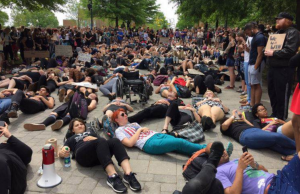Editor’s Note: As we’ve written about before, Vanderbilt University has thrown Christian student groups off campus unless they’re open to non-Christian leadership. Here’s an update on the case!
Our nation’s large private research universities have perfected a rather ingenious scam. They’ve lobbied state legislatures and Congress so effectively that they annually receive hundreds of millions of dollars in state and federal taxpayer dollars while at the same time escaping state oversight by pleading protection — as “private” organizations — from the prying eyes of the very taxpayers who keep them in business. In this manner they’re not that much different from the crony capitalists who clog the halls of power in Congress, always with the same refrain: More dollars, less oversight.
The end result is a taxpayer-funded “private” behemoth that sucks citizens dry even as it creates vast laboratories for far-left social experimentation. Nashville’s Vanderbilt University is perhaps the perfect example. As I’ve reported many times before, Vanderbilt, one of the top recipients of combined federal and state dollars, began a cynical and dishonest effort last year to cleanse the campus of Christian student groups by requiring that they open their leadership to individuals who don’t share the group’s faith. (Full disclosure: I’ve advised a number of Christian student groups throughout their struggle with the university.) In other words, according to Vanderbilt, a Catholic group must be open to Muslim leaders, a Baptist group to atheists, and Jewish groups to Hindus. More than a dozen Christian groups have now been forced off campus; it’s a policy that makes no sense except as a method of exclusion.
As part of its campaign to exclude campus Christians, Vanderbilt has compared Christian students to segregationists, has lied to the public about its policies and intentions, and has explicitly played favorites — imposing its policies on Christian groups while creating exceptions for the campus’s powerful fraternities and sororities.
Last year the Tennessee legislature stepped up in response, passing legislation — based on the amount of public funding Vanderbilt receives — requiring the university to protect its students’ most basic religious liberties. Unfortunately, however, Tennessee’s Republican governor, Bill Haslam, vetoed the legislation — claiming that he didn’t want to interfere with a “private” university’s freedom to define its own policies.
This term, the legislature may step up again. It turns out that Vanderbilt has a most unusual relationship with the state: It not only receives tens of millions of dollars in taxpayer funds, it is permitted to operate its own police force — a force fully clothed with the power of state law. In other words, Vanderbilt doesn’t just deploy state funds, it deploys the state’s own police power.
Led by Senator Mae Beavers and Representative Mark Pody, conservative Tennessee lawmakers are supporting a bill that presents Vanderbilt with a simple choice: Respect religious liberty or lose your police power. The State of Tennessee has a clear interest in protecting the religious liberty of its citizens, and it has an equally clear interest in ensuring that its state-authorized and state-empowered police forces are not used to enforce blatantly discriminatory policies regarding campus access. Under this proposed legislation, Vanderbilt can enact the policies it wants to enact, it merely has to choose to become a truly “private” university if it wishes to do so. Tennessee has some of the finest private colleges in America (including my own alma mater), and they function quite well using security guards rather than police. Either Vanderbilt decides to respect religious liberty, or it bears the full burdens of its ideological devotion to religious persecution.
Throughout this long fight, Vanderbilt has broadcasted its intention of showing other universities how they, too, can restrict Christian student groups on their campuses. It wants to be the “tip of the spear” in campus religious oppression. However, it may instead offer a different kind of example: How academic overreach and arrogance can awaken a legislature — a legislature that understands there is no such thing a blank check, and that state power should be used to protect liberty, not suppress it.
This post first ran at National Review Online.
Follow David on Facebook and Twitter and read more of the French Revolution Blog.










